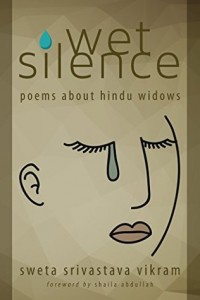 How many ways can you write about widowhood? In Wet Silence: Poems about Hindu Widows, Sweta Srivastava Vikram explores every nuance of what life is like for a Hindu widow in India. It’s as much a human exploration as a cultural one as Vikram delves into the aftermath of the complex relationships that underlie arranged marriages. Some of the widows in this collection are devastated that their beloved husbands have passed. Others rejoice in their new freedom from abuse and adultery. Still others face new complications in their relationships with the families to which they have now become burdensome.
How many ways can you write about widowhood? In Wet Silence: Poems about Hindu Widows, Sweta Srivastava Vikram explores every nuance of what life is like for a Hindu widow in India. It’s as much a human exploration as a cultural one as Vikram delves into the aftermath of the complex relationships that underlie arranged marriages. Some of the widows in this collection are devastated that their beloved husbands have passed. Others rejoice in their new freedom from abuse and adultery. Still others face new complications in their relationships with the families to which they have now become burdensome.
Marriage in India
Indian marriages are still predominantly arranged by the families of the bride and groom. Although there’s an increasing trend toward the couple having a say in the choice, that is not always the case. The result is sometimes a lasting bond where two people come to know and love each other inside a marriage they have been committed to by their families and culture, and sometimes the result is a very unhappy couple who cannot face the shame of divorce (which carries a much deeper burden of stigma than in the US).
Wet Silence explores the aftermath of both types of marriages from the “rum handprints” of “Wet Silence” to the “touch gentle as velvet” of “My Husband is Leaving”. We also meet servant girls others who lost lovers not strictly their husbands.
I water my memory of you—
it is all I have of youalong with your empty words
in the home we never built
where the mosquitoes feast on my skin.
– Sweta Vikram, “I Water My Memory of You”
Indian Widows
Visiting India last fall, it was easy to spot the widows (at least those who adhered to tradition). In a country full of bright colors, they wear white. They no longer wear jewelry or red vermilion (one of the signs of a married woman) in the parts of their hair. And their heads are sometimes shaven. They eat a restricted diet and are considered burdens to their families and bad luck to the world at large.
This removal of all that is feminine says a lot about the status of women in India and Wet Silence takes the reader inside that restricted world on an intimate level. Each poem contains a first person narrative by a widow and the book as a whole is the result of a series of interviews Vikram conducted with Indian widows.
Clarity vs. Abstraction of Language
In Great With Child, Beth Ann Fennelly recounts some writing advice she received where a poet told her about a city that experimented with blue taxis that had a more expensive fare but took you straight to your destination and red taxis with a cheaper fare that meandered. “Take the red taxi” he advised her about her poetry. The degree of directness is a choice every poet, really every writer, must make for themselves. One of my favorite moments of abstraction in Vikram’s poetry is in the poem “Pretense”:
When I hear belts unbuckle,
I say your name to taste you.
The sound cuts
through my brown flesh,
I become wounded again.
The abuse this woman must have suffered is present in the poem, but lingers perfectly in the background where we as readers can fill in our own details. Overall in Wet Silence, Vikram takes a more blue taxi approach—giving us straightforward poems that allow insight into what is for most of us a foreign culture. But I sometimes wish she’d meandered more—found more of a way to reach into the feeling of these widows’ experiences to find the inexpressible. Easy for me to say, I strive to take the red taxi but most of the time feel like a veteran driver of the blue.
If you’re interested to know more about the lives of women in India and like more direct poetry, Wet Silence might be just the book for you. But if you’re looking for a transformative linguistic experience that still explores the Indian experience, I’d recommend Bhanu Kapil’s Schizophrene instead.
To get your own insight into the experience of widowhood in India, pick up a copy of Wet Silence, from Powell’s Books. Your purchase keeps indie booksellers in business and I receive a commission.